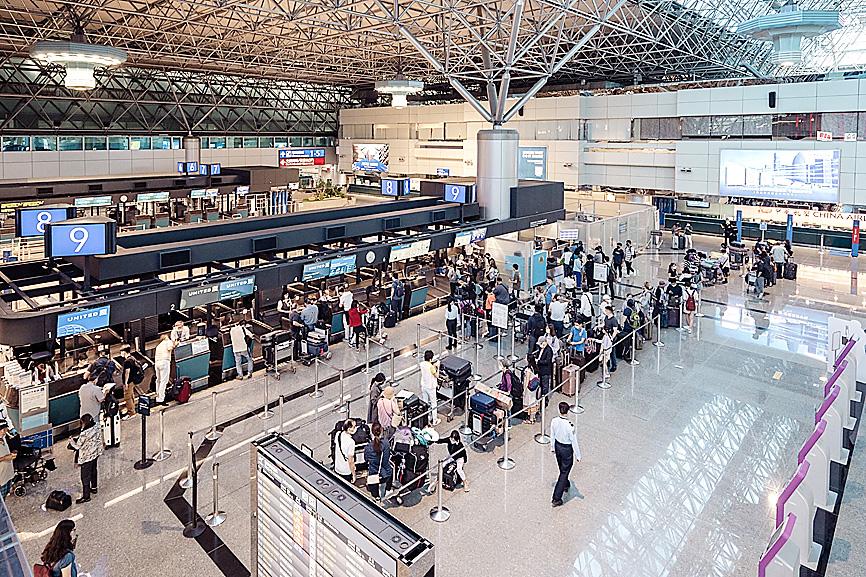People aged 18 or older who are planning to travel abroad for work would from today be eligible to receive a second booster COVID-19 vaccine shot, the Central Epidemic Command Center (CECC) said yesterday.
Those who wish to get vaccinated should bring their National Health Insurance card, vaccination record card, flight confirmation, and either an invitation from an overseas organization, a permit issued by a government authority or an approval letter from their workplace to the vaccination site, Deputy Minister of Health and Welfare Victor Wang (王必勝), who heads the CECC, told the center’s daily news conference.
The expansion applies to those traveling abroad for work, such as for foreign affairs, government, or business purposes, Wang said.

Photo courtesy of Taiwan Taoyuan International Airport via CNA
The CECC is considering expanding eligibility to those planning to study abroad, Wang said.
The minimum interval between the first and second booster is 150 days, Centers for Disease Control Deputy Director-General Chuang Jen-hsiang (莊人祥), the CECC’s spokesman, told the Central News Agency.
People should receive the second booster at least two weeks before their departure date, he said.
Second boosters have previously been available to people aged 65 or older, residents of long-term care facilities, medical workers, immunocompromised people, airline crew members, care facility employees, those working at airports and other ports of entry, and people whose job requires them to be in contact with people under quarantine.
The CECC on Wednesday announced that people aged 50 to 64 would from today also be eligible to receive a second booster shot.
The CECC said it has prepared a map showing hospitals and clinics that offer second booster doses.
Those interested could also contact their district health centers for more information, it said.
To date, 91.5 percent of Taiwan’s population has received at least one dose of a COVID-19 vaccine, 85.6 percent have received at least two doses, and 71 percent have received a booster dose.

US climber Alex Honnold is to attempt to scale Taipei 101 without a rope and harness in a live Netflix special on Jan. 24, the streaming platform announced on Wednesday. Accounting for the time difference, the two-hour broadcast of Honnold’s climb, called Skyscraper Live, is to air on Jan. 23 in the US, Netflix said in a statement. Honnold, 40, was the first person ever to free solo climb the 900m El Capitan rock formation in Yosemite National Park — a feat that was recorded and later made into the 2018 documentary film Free Solo. Netflix previewed Skyscraper Live in October, after videos

Starting on Jan. 1, YouBike riders must have insurance to use the service, and a six-month trial of NT$5 coupons under certain conditions would be implemented to balance bike shortages, a joint statement from transportation departments across Taipei, New Taipei City and Taoyuan announced yesterday. The rental bike system operator said that coupons would be offered to riders to rent bikes from full stations, for riders who take out an electric-assisted bike from a full station, and for riders who return a bike to an empty station. All riders with YouBike accounts are automatically eligible for the program, and each membership account

A classified Pentagon-produced, multiyear assessment — the Overmatch brief — highlighted unreported Chinese capabilities to destroy US military assets and identified US supply chain choke points, painting a disturbing picture of waning US military might, a New York Times editorial published on Monday said. US Secretary of Defense Pete Hegseth’s comments in November last year that “we lose every time” in Pentagon-conducted war games pitting the US against China further highlighted the uncertainty about the US’ capability to intervene in the event of a Chinese invasion of Taiwan. “It shows the Pentagon’s overreliance on expensive, vulnerable weapons as adversaries field cheap, technologically

Temperatures are forecast to drop steadily as a continental cold air mass moves across Taiwan, with some areas also likely to see heavy rainfall, the Central Weather Administration (CWA) said. From today through early tomorrow, a cold air mass would keep temperatures low across central and northern Taiwan, and the eastern half of Taiwan proper, with isolated brief showers forecast along Keelung’s north coast, Taipei and New Taipei City’s mountainous areas and eastern Taiwan, it said. Lows of 11°C to 15°C are forecast in central and northern Taiwan, Yilan County, and the outlying Kinmen and Lienchiang (Matsu) counties, and 14°C to 17°C